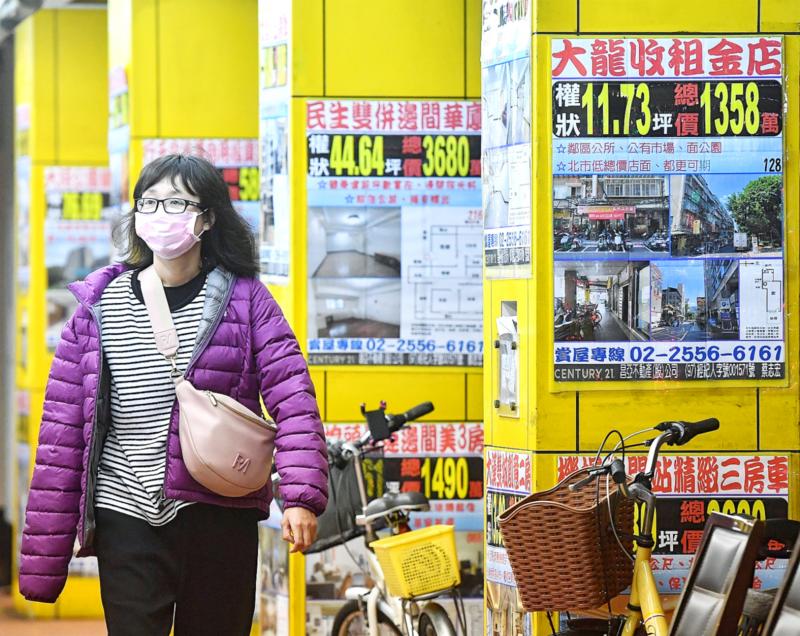The value of new presale and housing products launched last quarter totaled NT$324.8 billion (US$11.43 billion), a 9.2 percent increase from a year earlier, a survey released by Cathay Real Estate Development Co (國泰建設) showed on Wednesday.
“The market is recovering, as we can see from the trading volume and prices,” Cathay Real Estate said in a quarterly report.
Presale and new housing prices averaged NT$300,200 per ping (3.3m2) nationwide last quarter, it said.

Photo: CNA
Prices in Taipei grew faster than in other areas, to NT$865,800 per ping, while prices reached NT$400,300 per ping in New Taipei City, Cathay Real Estate said.
Housing prices are relatively affordable at NT$267,200 per ping in Taoyuan, NT$257,100 per ping in Taichung, NT$235,300 per ping in Tainan and NT$239,600 per ping in Kaohsiung, it said.
Apartment prices rose 9.3 percent year-on-year across Taiwan, with price increases of 6.47 percent in Taichung and 13.63 percent in Tainan, it said.
However, New Taipei City bucked the uptrend with a 1.29 percent decline, Cathay Real Estate added.
While apartments are the dominant housing type in northern Taiwan, and townhouses are more common in the south, it said.
Overall, the market remained healthy after the central bank in early December introduced new credit controls to curb property speculation and the legislature passed rules requiring greater transparency on transaction data, Cathay Real Estate said.
The National Development Council’s plan to create a business climate index to monitor changes in the housing market would help policymakers better understand developments in the sector, it said.

TAKING STOCK: A Taiwanese cookware firm in Vietnam urged customers to assess inventory or place orders early so shipments can reach the US while tariffs are paused Taiwanese businesses in Vietnam are exploring alternatives after the White House imposed a 46 percent import duty on Vietnamese goods, following US President Donald Trump’s announcement of “reciprocal” tariffs on the US’ trading partners. Lo Shih-liang (羅世良), chairman of Brico Industry Co (裕茂工業), a Taiwanese company that manufactures cast iron cookware and stove components in Vietnam, said that more than 40 percent of his business was tied to the US market, describing the constant US policy shifts as an emotional roller coaster. “I work during the day and stay up all night watching the news. I’ve been following US news until 3am

UNCERTAINTY: Innolux activated a stringent supply chain management mechanism, as it did during the COVID-19 pandemic, to ensure optimal inventory levels for customers Flat-panel display makers AUO Corp (友達) and Innolux Corp (群創) yesterday said that about 12 to 20 percent of their display business is at risk of potential US tariffs and that they would relocate production or shipment destinations to mitigate the levies’ effects. US tariffs would have a direct impact of US$200 million on AUO’s revenue, company chairman Paul Peng (彭雙浪) told reporters on the sidelines of the Touch Taiwan trade show in Taipei yesterday. That would make up about 12 percent of the company’s overall revenue. To cope with the tariff uncertainty, AUO plans to allocate its production to manufacturing facilities in

COLLABORATION: Given Taiwan’s key position in global supply chains, the US firm is discussing strategies with local partners and clients to deal with global uncertainties Advanced Micro Devices Inc (AMD) yesterday said it is meeting with local ecosystem partners, including Taiwan Semiconductor Manufacturing Co (TSMC, 台積電), to discuss strategies, including long-term manufacturing, to navigate uncertainties such as US tariffs, as Taiwan occupies an important position in global supply chains. AMD chief executive officer Lisa Su (蘇姿丰) told reporters that Taiwan is an important part of the chip designer’s ecosystem and she is discussing with partners and customers in Taiwan to forge strong collaborations on different areas during this critical period. AMD has just become the first artificial-intelligence (AI) server chip customer of TSMC to utilize its advanced

Six years ago, LVMH’s billionaire CEO Bernard Arnault and US President Donald Trump cut the blue ribbon on a factory in rural Texas that would make designer handbags for Louis Vuitton, one of the world’s best-known luxury brands. However, since the high-profile opening, the factory has faced a host of problems limiting production, 11 former Louis Vuitton employees said. The site has consistently ranked among the worst-performing for Louis Vuitton globally, “significantly” underperforming other facilities, said three former Louis Vuitton workers and a senior industry source, who cited internal rankings shared with staff. The plant’s problems — which have not